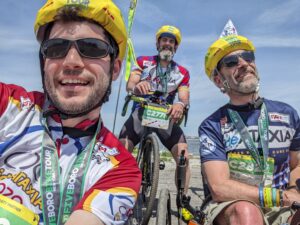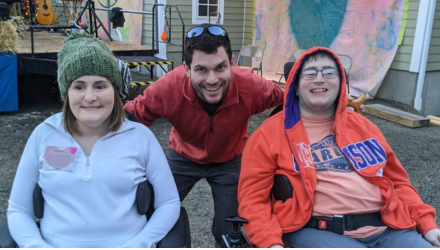Please share any updates since your last interview.
I have had a lot of changes (good and bad) since my first interview 9 years ago. The big life changes are: I changed jobs, bought a house, and paid off my college loans. I’ve attended dozens of weddings, traveled with family and friends, logged more miles on my trike, learned yoga, and expanded my culinary skills. It’s not all positive – I’m learning there is a balance to all things. A few years ago, I had a fall that split my head open and one that broke my thumb. Luckily, there were no severe accidents or complications, but the negatives are part of the experience and I am learning how to live safely while still pursuing my ambitions.

With FA, I am still living independently with supportive family and friends. Over the past decade, I have been heavily involved with FARA, raising funds for research, participating in research studies, and meeting other FAers, family, friends, supporters, researchers, industry peers … all new friends. This is the most rewarding aspect of my life; meeting new people, hearing their stories, learning from their experiences and being able to form deep, meaningful connections with others (FA or not).
10 years ago, I had just been diagnosed. Omaveloxolone has just started in-patient clinical trials, and promising new therapies were being developed on lab benches. Now, omaveloxolone has been approved as the first treatment for FA (as Skyclarys) and many of those other therapies – gene therapies, protein replacement, gene expression modifiers, and more – are starting clinical trials. It’s never fast enough when you’re living with FA, but seeing, living and feeling the impact of the recent progress is unbelievable. The experience has taught me patience and gratitude.
How and when did you start your career? I’ve always been a problem solver and project builder. I remember as a child building a homemade luge with steering arms that my brothers and I raced down the steep hill in our neighborhood (to all the mom’s out there – we wore our helmets!). After getting my engineering degree, I worked in production plants and on manufacturing floors, bringing technical solutions to improve products and operations. I love working with my hands and learning from everyone working on the line.
Shortly after I was diagnosed in 2015, I moved back home to RI and started working for my family’s small manufacturing business. After summers cleaning bathrooms, shining grease-covered machines, and sorting parts in my youth, I never planned on returning. But it worked out as an avenue to keep applying my technical engineering skills to part manufacturing while also providing flexibility to attend to my health and volunteer responsibilities with FARA. Over the years, I handled all aspects of operations of the business; it’s been a rewarding education, forcing me to learn accounting, finance, human resource, quality, purchasing, manufacturing, people management, customer service, sales, marketing, and more.
What do you enjoy most about your work? Many will say I’m a workaholic – I won’t disagree. I average six days and over 40 hours of work each week. Is it because this is my dream job? No, it’s not. Some days I love it, some days I hate it. But every day it gives me purpose. As I lose abilities with FA, my job is a place I have control over what I do and can contribute meaningful improvements to the team. It allows me to focus on solving problems instead of focusing on the negatives of FA.
I believe having a purpose is critical in managing FA – working, solving problems, and challenging my technical skills is my purpose. For others, it is being an exceptional parent, mastering a loved hobby, pursuing humanitarian missions, dedicating oneself to a physical activity or exercise, and so much more. When I meet anyone (FA or not) I always try to discover their purpose; it motivates, drives and defines us. I challenge everyone to find their purpose and pursue it relentlessly. There will be obstacles and FA will make the pursuit more difficult, but we know people by what drives them – not a two-letter disease on their medical record.
The other reason I work a lot – the money! I have house renovation projects, vacations and trips, activities throughout the year, charitable events to support, etc … I work hard to play hard. I always balance the long hours with fun activities with family and friends. I don’t know what I’ll be able to do in the future with FA so my approach now is to contribute where I can and build a solid financial foundation for the future. That way, I’ll be able to enjoy the next phase of life with new ambitions when I get there. And I’m hopeful that the future includes curative therapies for FA!
Does FA impact your job? Please share any adaptations you’ve made to be able to work. As FA has progressed, I’ve needed to modify how I approach situations and solve problems. I used to handle all operations; production schedule, employee issues, training, etc. Over the past year, I’ve shifted away from these responsibilities. It became more difficult to maintain a fixed production schedule with my energy declining, fatigue becoming more pronounced and medical appointments interfering with my day. Luckily, I work with a supportive and understanding team so we discussed these concerns and came up with a solution together, with others assuming more responsibilities to grow into these roles. It’s allowed me to focus on larger strategic projects. Over the past year, I taught myself 3D modeling and re-designed and re-built our custom 4-slide miniature precision diecasting machine with the team. I’m continually grateful to have a talented technical team to convert my ideas and concepts to steel.
I still walk the floor to interface with people and machines but spend less time hands-on, as my worsening balance and coordination poses safety risks. I won’t lie, it is extremely frustrating not being able to do the things I want to. But the goal is to get the job done, not for me to do everything. So I’ve learned how to communicate, delegate, and train. Progress isn’t easy with FA but with self-determination, a supportive team, and a healthy dose of stubbornness, we keep getting better every day!
Interview by
Mary Nadon Scott
